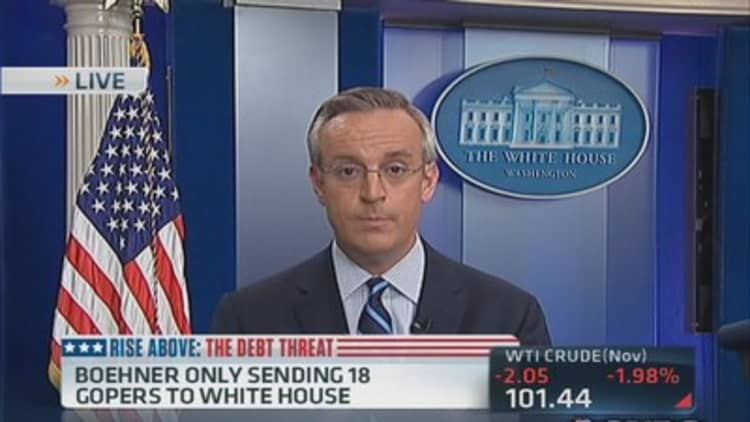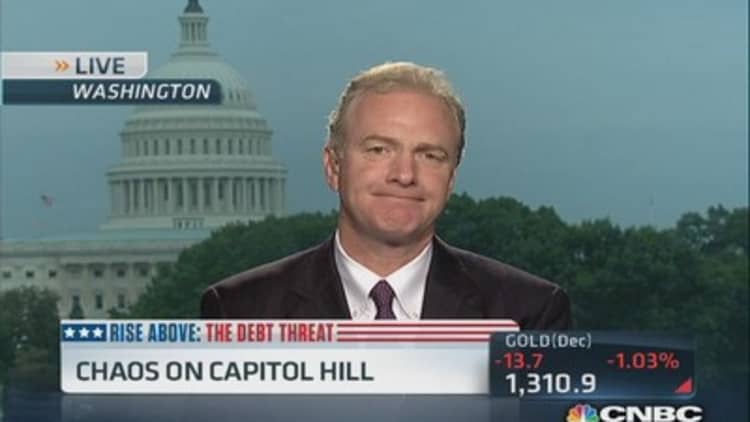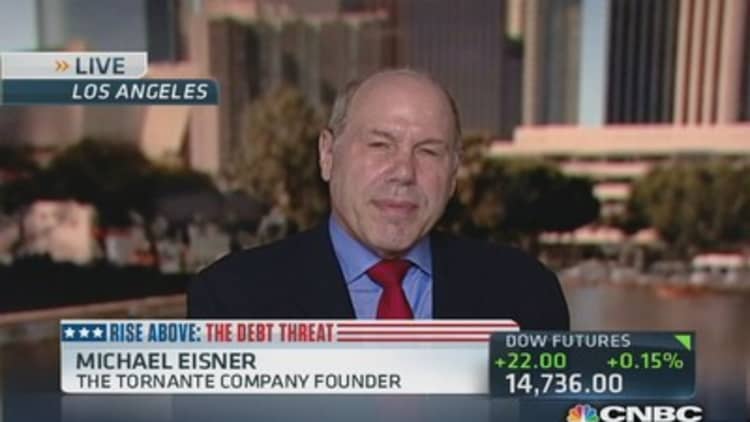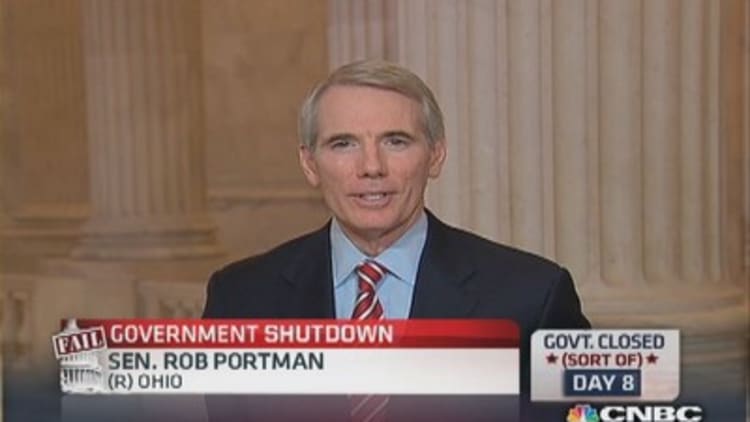
Facing a looming federal default, the House GOP leadership will meet with President Barack Obama at the White House on Thursday in a bid to resolve the budget deadlock that has shut down much of government for more than nine days.
Word of the meeting came after House Speaker John Boehner and Majority Leader Eric Cantor and met with House Minority Leader Nancy Pelosi and her fellow Democrat Steny Hoyer of Maryland.
"Reps. Pelosi and Hoyer asked for the meeting, and as we've stated publicly, we're willing to meet with any Democratic leader who is willing to talk," said Michael Steele, a spokesman for Boehner, R-Ohio.
Earlier, administration officials said President Barack Obama is making plans to talk with Republican lawmakers at the White House in the coming days as pressure builds on both sides to resolve their deadlock over the federal debt limit and the partial government shutdown.
With the shutdown in its ninth day Wednesday and a potential economy-shaking federal default edging ever closer, neither side was revealing clear signs of bending.
Amid the tough talk, though, there were hints of the possibility of a brief truce. There were indications that both sides might be open to a short-term extension of the $16.7 trillion borrowing limit and a temporary end to the shutdown, giving them more time to resolve their disputes.
Obama was to huddle with House Democrats Wednesday afternoon as both parties look for a way forward.
So far, the underlying standoff remains the same. Republicans demand talks on deficit reduction and Obama's 2010 health care law as the price for boosting the government's borrowing authority and returning civil servants to work. The president insists that Congress first end the shutdown and extend the debt limit before he will negotiate.
Don Stewart, spokesman for Senate Minority Leader Mitch McConnell, R-Ky., said GOP senators hoped Obama's desire to meet with them meant he was willing to bargain.
"But if this is a meeting where he simply reiterates that he won't negotiate, this meeting will not be productive," Stewart said.

On Tuesday, Boehner told reporters he was not drawing "lines in the sand." He sidestepped a question about whether he'd raise the debt limit and fund government for short periods by saying, "I'm not going to get into a whole lot of speculation."
(Read more: Boehner: No 'lines in the sand' on debt limit)
Hours later, Obama used a White House news conference to say he "absolutely" would negotiate with Republicans on "every item in the budget" if Congress first sent him short-term measures halting the shutdown and the extending the debt limit.
(Read more: House GOP doesn't get to demand ransom: Obama)
"There's a crack there," Boehner said of the clash late Tuesday, though he cautioned against optimism.
The back-and-forth came as the financial world flashed unmistakable signs that it feared Washington's twin battles could hurt the economy.
The stock market declined again Tuesday, with the Dow Jones industrial average dropping nearly 160 points, or 1.1 percent. The International Monetary Fund trimmed its global and U.S. growth forecasts through 2014, warning that failure to renew the debt limit would raise interest rates and potentially shove the American economy back into recession.
The Obama administration has said that unless Congress acts, it expects to have an estimated $30 billion in cash left by Oct. 17. That is pocket change for a government that can spend tens of billions more than that on busy days and $3.6 trillion a year.

Hitting that date without congressional action would risk an unprecedented federal default that would wound the economy and deal lasting harm to the government's ability to borrow money, many economists warn. Some Republicans have expressed doubt that the damage would be as severe.
On Tuesday, Senate Democrats introduced legislation that would avoid those scenarios by letting the government borrow money through Dec. 31, 2014. It contained no spending cuts or other deficit-cutting steps many Republicans seek.
The bill's fate was uncertain, since the 54 votes Democrats can usually muster are short of the 60 votes they would need to overcome a conservative filibuster aimed at derailing the bill. An initial test vote seemed likely by Saturday.
Tuesday's economic tremors did little to alter each side's demands.

Obama said he would negotiate, but added: "I'm not going to do it until the more extreme parts of the Republican Party stop forcing John Boehner to issue threats about our economy. We can't make extortion routine as part of our democracy."
Two hours later, Boehner stood firm.
"What the president said today was if there's unconditional surrender by Republicans, he'll sit down and talk to us," Boehner said. "That's not the way our government works."
(Read more: Some in GOP say: Default? So What?)
Meanwhile, Rep. Paul Ryan, Republican chairman of the House Budget Committee and the party's candidate for vice president, proposed in a Wall Street Journal op-ed published Wednesday that the stalemate be resolved by having both sides agree to "common sense reforms of the country's entitlement programs and tax code."

Ryan suggested Obama was being disingenuous about refusing to discuss policy issues as part of the process of getting the debt limit increased and getting passage of a stopgap spending bill to allow the government to resume normal operations.
He said that "many presidents have negotiated on the debt ceiling—including him."
In the House, Republicans were continuing their tactic of pushing through narrowly targeted bills—over Democratic objections—that would restart popular parts of the government.
On Wednesday, they planned votes on a measure financing death benefits to families of fallen U.S. troops. Blaming the shutdown, the Pentagon has halted the $100,000 payments, usually made within three days of a death, a stoppage Boehner called "disgraceful."
On Tuesday, the House approved a GOP bill providing money for Head Start preschool programs for low-income children.
It also voted to promptly pay federal employees who have been working without paychecks during the shutdown and to establish a bipartisan congressional committee to negotiate ways to reduce the budget deficit. The White House threatened vetoes of both, saying the House should instead reopen the entire government and extend the debt limit.
Earlier Tuesday, House Republicans met privately but produced no new approaches to their shutdown and debt limit impasses.
Participants said Boehner described a weekend visit to a Washington grocery store at which, he said, two-thirds of the people who recognized him smiled and treated him well. That, they said, was a half-joking indication of public approval of the GOP stance -- despite recent polling showing more people are faulting Republicans than Obama and Democrats in the fight.
Boehner also told his GOP colleagues that Senate Majority Leader Harry Reid, D-Nev., is trying to "annihilate" them. Reid has repeatedly demanded that Republicans drop their insistence on negotiations and quickly vote to end the shutdown and extend the borrowing limit.
The private GOP meeting was described on condition of anonymity by attendees.
—By The Associated Press with CNBC.com.

